Living and Learning: protected characteristics – BSL
Year 5/6 have been offered a course in British Sign Language. Over the next four weeks, we will join Helen, her interpreter and a few other schools from across Leeds to learn some basic sign language.
Last week, we learned how to have a simple conversation and say the alphabet (link for left handed).
Help at home: discuss the importance of being able to communicate effectively. Help your child to recall some of the signs.
Reading Records
Wow! We are super impressed by how well presented our reading records are. Children are investing lots of their own time into creating a response to their reading. When discussing their books in class, children from 5/6C have been enthustiastic and articulate. Thank you to all the children and parents who have worked hard to ensure that a love of reading is our top priority.
At home, keep up the good work with reading:
- read aloud for at least 15 minutes a night
- discuss stories and make connections between different books/ texts
- get an adult to read to you daily (sometimes this could be through stories which are online)
- recommend books to family and friends





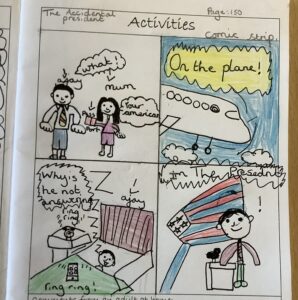

Author visit: Liz Pichon
On Friday, the children in year 5/6 were fortunate enough to attend a live workshop with the author of the Tom Gates series – Liz Pichon.
During the workshop, we learned how to create doodles which matched her style. It was also a great opportunity to get inspired to write our own funny stories for a competition.
At home, take a look at Pichon’s website and get writing your own funny stories.
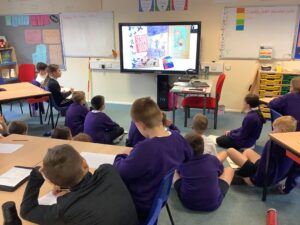
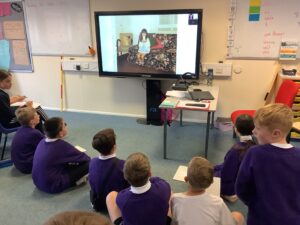
We’re going on a Bear Hunt
It was great to see some of your autumn ‘treasure’ from the little brown bags that we sent home this week. Children have enjoyed telling us all about the things they have collected and where they found them. It sounds like lots of you have had fun visiting local parks or looking for autumn things on the walk to Nursery. We’ve heard some super descriptive language (shiny, spiky, smooth) and the conkers are providing endless opportunities to talk about size. We love to line them up in size order.
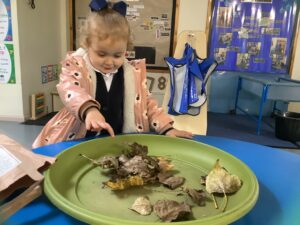
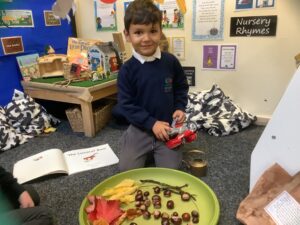
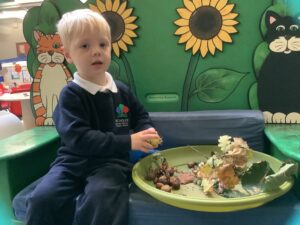
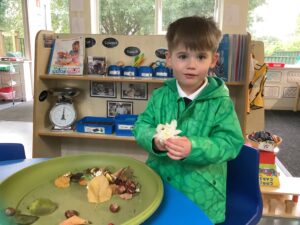
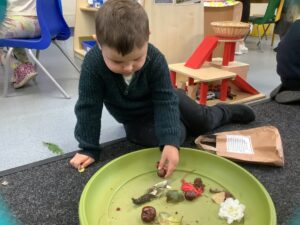
Thank you to everyone who has returned them already. Don’t worry if you haven’t had a chance to fill them yet, there’s still time! Please bring them to Nursery when they’re full and we’ll add them to our autumn tray.
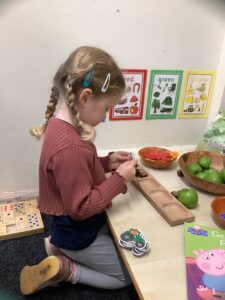
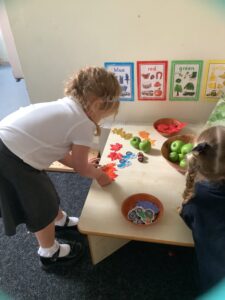
![]() In maths, we’re learning to match objects and to sort objects in different ways (such as by type, colour or size). Next week, we’ll be sorting our autumn treasure into different groups including conkers, pine cones, sticks and leaves.
In maths, we’re learning to match objects and to sort objects in different ways (such as by type, colour or size). Next week, we’ll be sorting our autumn treasure into different groups including conkers, pine cones, sticks and leaves.
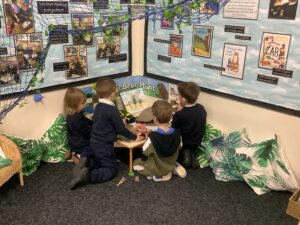
In our story time this week, we’ve loved listening to one of our favourite stories, ‘We’re going on a Bear Hunt‘ by Michael Rosen. Children are really enjoying this story and have been using the props in our story corner to re-tell the story. Have a listen to Michael Rosen telling the story using the link above – it’s great!
Top tip for watching YouTube with your child: Go to the settings cog (it’s along the play bar) and turn off autoplay – this avoids an inappropriate clip coming up automatically, and helps to discourage your child from passively watching clip after clip.
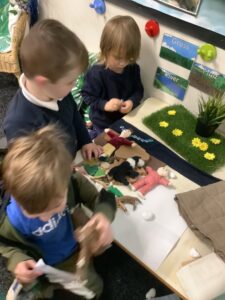
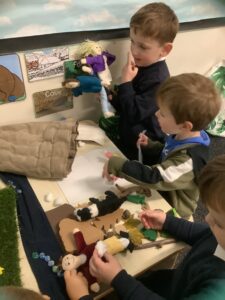
Reminders:
- We have a few more family photos to print and add to our home corner display this week, thank you for e-mailing us. Please see our previous posts if you haven’t sent us one yet – there’s still time.
- Please make sure your child has a rain coat with a hood at Nursery every day; we never know what the weather is going to be like and we play out in ALL weather! Thank you.
We’re Going on a Bear Hunt
Literacy
This week, our focus book was We’re Going on a Bear Hunt.
The children were able to use their knowledge of the story to retell it using pictures and props.

Geography
On Tuesday, we went for a walk in our local area. This involved following a map and looking at different symbols to find landmarks.

Philosophy Friday
Did you know, each Friday morning we take part in Philosophy Friday? In Reception, we use this time to focus on asking questions that encourage the children to think beyond the ‘here and now’. We are starting with some ‘Would you rather…’ questions. This week’s question was would you rather live with chickens in a coop or a dog in a kennel?
Kennel because I love dogs.
With a chicken because I like to eat eggs.
A dog because they are fluffy and cute.
Maths
This week, we have explored how numbers can be composed of 1s.
We have will learnt that a ‘whole’ is made up of smaller parts and is, therefore, bigger than its parts.

Phonics
Autumn 1 week 4 has focused on the new phonemes:
ck,e,u,r.
Ck is our first diagraph ( two letters that make one sound).
We’ve also learnt a new tricky word; I.

Poetry Picnic
Each week, we will be learning a new poem. We will recite this poem each day. By saying the poem out loud, we can focus on the sounds and rhythm of each word or line. We talk to the children about how this can help us become better readers. This week’s poem is called Falling Apples.
Watch Sunshine Class recite the poem here.
Other learning

Stay and Learn
Our first stay and learn session will be on Thursday 12 October.
This is an opportunity for you to come into school to find out about phonics and watch your child learning in school. There will also be a coffee morning after the session.
3,4 A Class News
In Science, we’ve been learning about different types of skeleton. Today we learnt about exoskeletons and classified different animals using a Venn diagram.
Help at home by quizzing us on these terms – see if we can give you a definition!
- exoskeleton
- insect
- invertebrate
Later on in the day, we went out to see if we could find any of these in the school grounds.
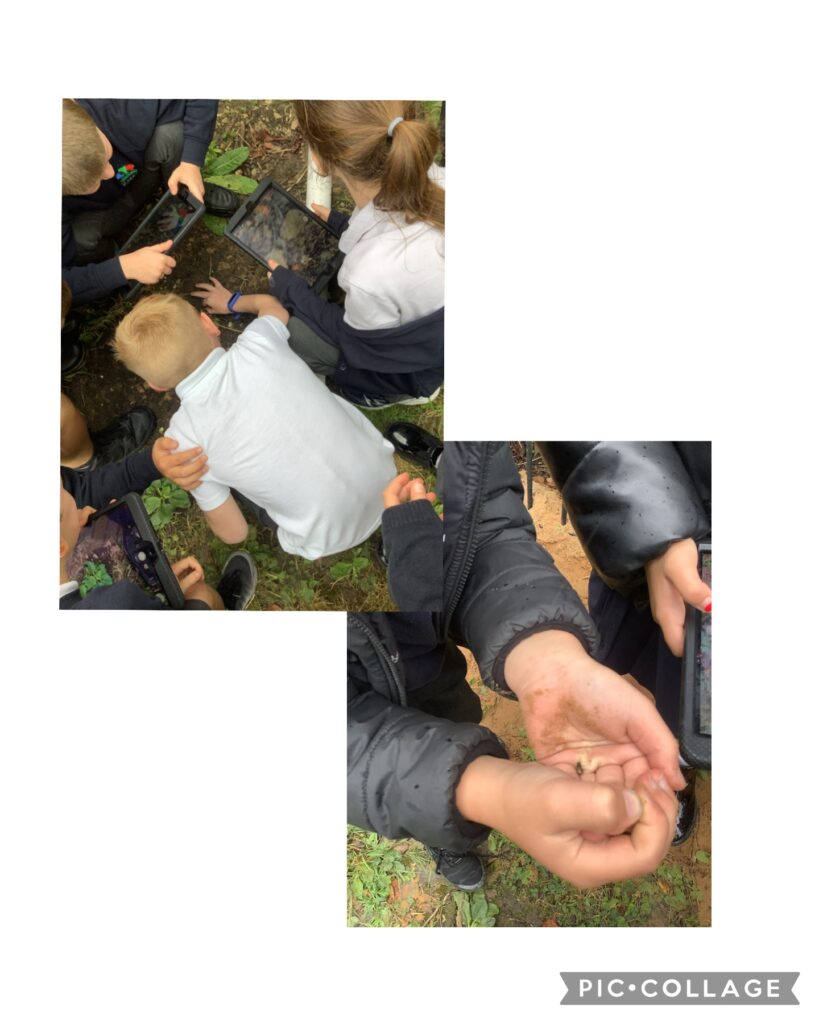
Geography – Never Eat Shredded Wheat!
This week KS1 have been learning about 4 points on a compass; North, East, South and West.
We came up with a few rhymes to remember each of the points on the compass.
We like ‘Never Eat Silly Worms’ the best!
We had some brilliant discussions about compasses, how they work and how they help us with directions. We even labelled our classrooms with each compass point. During the lesson, each class went out onto the KS2 playground to ‘hunt’ for the compass. Once we found it we discussed where each arrow pointed to. We played some games so that the children had the chance to practise which direction each letter on the compass points to.
See some of our photographs below!
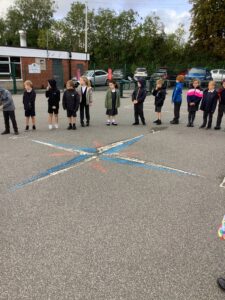
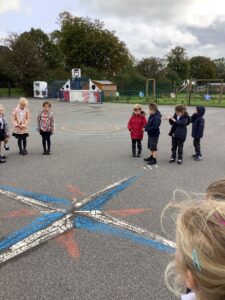
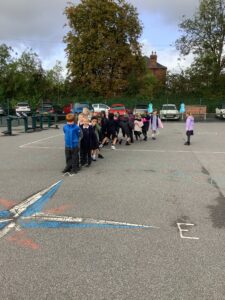
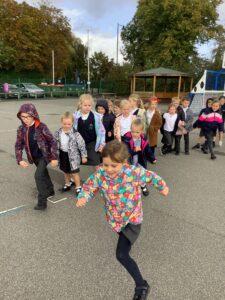
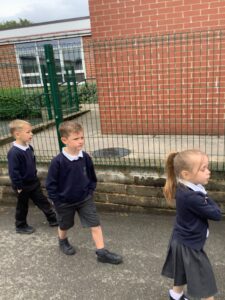
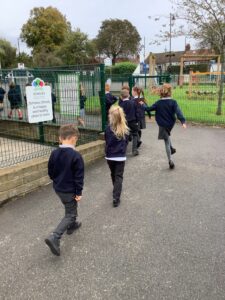
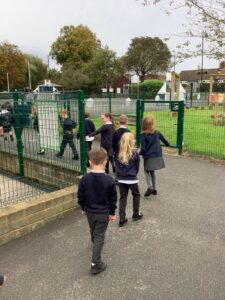
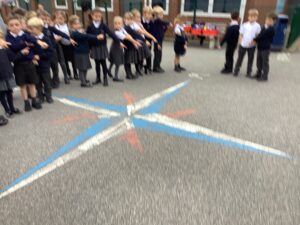
Science – sound
This week in 2C Science we have been learning about the ears and their purpose. We know that our ears help us to hear different sounds.
We played lots of different instruments at different volumes. We learnt that it was easier to hear the sounds that were played the loudest (by hitting them, or blowing into them, on banging on them). We also learnt that it was more difficult to hear the quieter sounds.
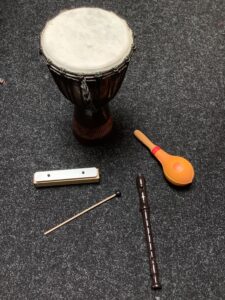
Old MacDonald had a farm
Children loved the new small world farm area this week. We sorted the animals into different pens and sang ‘Old MacDonald had a farm‘ as we played. Children enjoyed adding the animal sound effects to the song; we’re sure you could hear the ‘moooooos’ and ‘baaaaaass’ throughout school!


As part of our early phonics learning, we encourage children to listen to the sounds that they can hear around them, such as an aeroplane flying above or birds singing in the trees. We also explore the different noises that animals make.
Help at home: Sing ‘Old MacDonald had a farm’ together to help your child become familiar with the words and tune. If you visit a farm or see some animals in a field, remember to use the animal names and talk about the noises that they make. You might like to play a game where you use some farm animal toys and choose an animal to describe. For example: It has 4 legs, a curly tail and a snout. Can they guess which animal you are describing and make the animal noise? Can they give you some clues? This is a great way to add new words to your child’s vocabulary and to develop their listening skills.
This week, we listened to the story of ‘The Three Little Pigs’ and used the puppets in the story corner to re-tell the story with our friends. The construction area has also been popular. We saw some great team work as children worked together to build a boat. They added seats and some lights and set off on an adventure, sailing through a storm (on the windy day!).



We’ve also enjoyed picnics in the home corner and scooping, pouring and using sieves with fine sand in the sensory area.


Next week, we’ll begin to learn about autumn and we’ll read the popular story, ‘We’re going on a bear hunt’. Look out for a little brown bag in your child’s folder – we’d like you to fill it with autumn treasure and return it to Nursery.
Reminders:
- Thank you to everyone that has e-mailed a family photograph for our home corner display. Don’t worry if you haven’t sent it yet, there’s still time! Please send it to scholesnursery@spherefederation.org
- We play outside in all weather – please remember to send your child with a waterproof coat everyday.
The Everywhere Bear
The Everywhere Bear
We’ve been reading The Everywhere Bear by Julia Donaldson.

The story follows a class bear that goes on quite the journey! We’ve been re-telling parts of the story and have used it to introduce our own travelling teddies- Lissy and Monty. Lissy and Monty will be coming home with a child each weekend, along with a book to record their adventures.
Rainbow Class- The Everywhere Bear 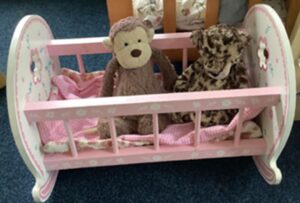
On Thursday, we watched a specially streamed video of our focus author (Julia Donaldson), as she spoke about her new book The Oak Tree. We also watched the illustrator of the book demonstrate how she created her digital illustrations.

Maths; counting principles
In Maths, we’ve been using toys to demonstrate accurate counting. We’ve been reminding our toys to ‘stop at the stopping number’ to find the total amount (cardinality), only count each item once (one-to-one correspondence) and know that objects can be counted in any order (order irrelevance) We’ve been looking at ways to make counting easier. We’ve also been counting things that cannot be seen (such as sounds or actions) and things that cannot be moved, by using a ‘tagging wand’.
In our groups we’ve been counting knocks we can hear, making marks and counting them and counting different quantities of small objects.

Maps; Exploring maps of our local area
Our focus story has led us to discussions about journeys we have been on. We’ve been exploring some maps of our local area and next week, we’ll begin to make our own maps. We will also we taking a real walking journey around Scholes!
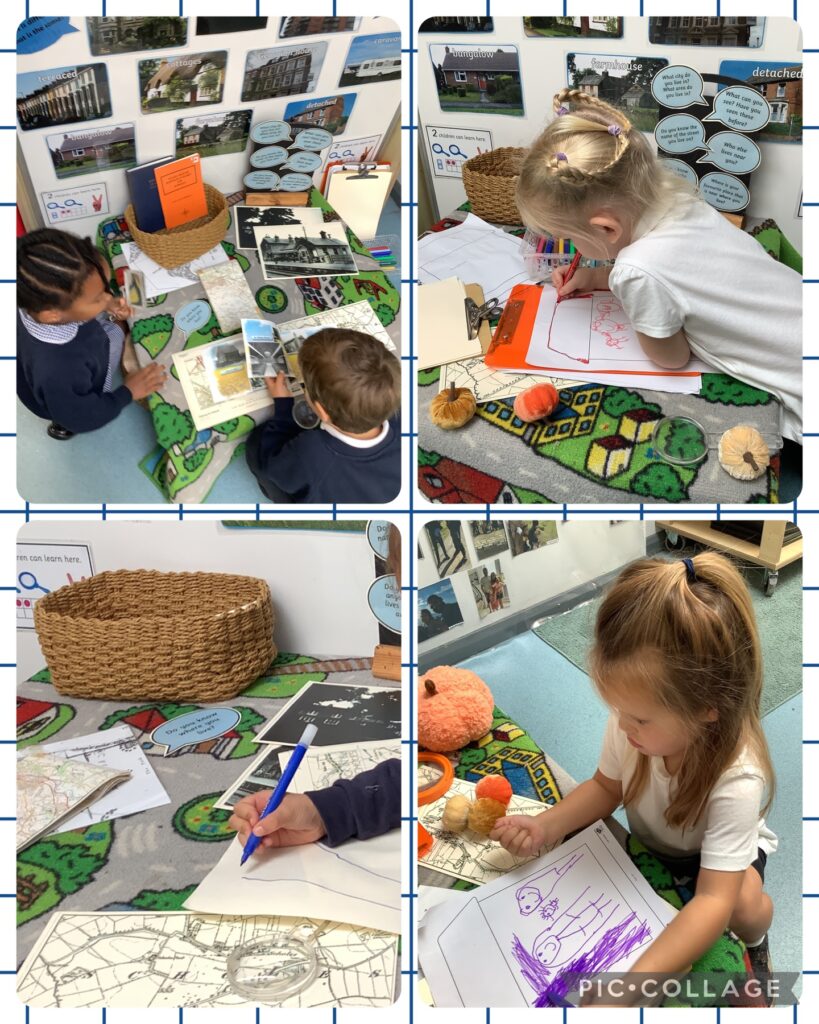
Philosophy Friday
Did you know, each Friday morning we take part in Philosophy Friday? In Reception, we use this time to focus on asking questions that encourage the children to think beyond the ‘here and now’. We are starting with some ‘Would you rather…’ questions. Last week’s question was: ‘would you rather have a jungle, or water outside your house?’
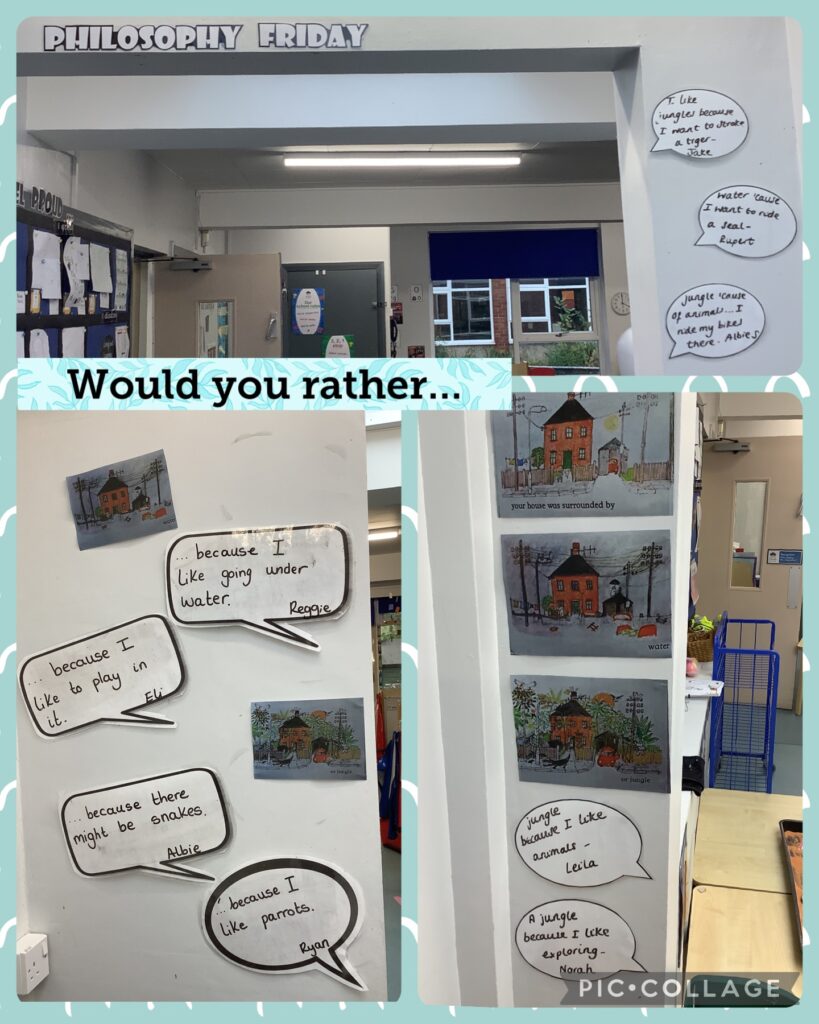
Phonics
Autumn 1 week 3 has focused on the new phonemes:
g,o,c,k
We’ve also learnt our first tricky word; is
Tricky words are words that should be read by sight. We start by identifying which part of the word is ‘tricky’. In is, the ‘s’ is tricky because it makes the /z/ sound.
Poetry Picnic
Each week we will be learning a new poem. We will recite this poem each day. By saying the poem out loud, we can focus on the sounds and rhythm of each word or line. We talk to the children about how this can help us become better readers. This week’s poem is called Breezy Weather

We talk about how a poem sometimes has rhyming words and sometimes doesn’t. We also talk about how a poem can have a fast rhythm or a slow rhythm.
Click below to watch Reception recite this week’s poem!
More pictures of our learning this week…

Help at home; Autumn Walks


Dates for your diary; time changes
We have changed the timing of some our stay and learn session to incorporate anopportunity for you to meet with your child’s teacher and other parents at a coffee morning.
Stay and learn sessions
This is an opportunity for you to come into school to find out about the Early Years Curriculum and watch your child learning in school.
Phonics Phase 2 – 12.10.23 – 9.00 – 10.00 (with coffee morning)
Maths – 15.11.23 – 09.00 – 10.00
Phonics Phase 3 – 16.01.24 – 09.00 – 10.00 (with coffee morning)
Fine Motor Control and Writing –06.02.24 – 09.00 – 10.00 (with coffee morning)
World Book Day- 07.03.24 – 8.50- 9.20
Learning Journey Drop In’s
An opportunity to “drop into” school and share your child’s learning journal with them.
Times – 8.45 am-9.15am and 3.15pm-3.45pm (Tuesday and Thursday)
Week beginning 11.12.23
Week beginning 25.03.24
Week beginning 08.07.24
Swimming
Due to work being done on the pool, next week’s swimming lessons for Rainbow Class are cancelled. Please still send children to school in their PE kit, as they will take part in a Foot-tech PE session. We will keep you updated of any future changes in each week’s class news post.
